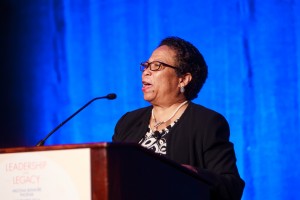Feb 05, 2015
A New Future for Nursing Takes Shape

Linda Burnes Bolton DrPH, RN, FAAN, vice president for nursing, chief nursing officer, and director of nursing research at Cedars-Sinai Medical Center
The new kind of nursing workforce envisioned by the Institute of Medicine (IOM) in its groundbreaking 2010 report was on display at the Future of Nursing: Campaign for Action Leadership and Legacy Summit in Phoenix, Arizona late last year. Hundreds of nurses from every corner of the country gathered to discuss new ways to provide care and promote health, new partners to engage in this work, new strategies to reform public and payer policies, and much more.
The summit featured experts and leaders from both within and outside the nursing community. Participants focused not just on topics that have long concerned nurses, but also on placing more nurses on governing boards of health-related organizations and commissions; making nurses full partners who build and serve on interdisciplinary care teams; spurring change that will create a Culture of Health in this country; and expanding the role of nurses in every aspect of health care.
Some of that is already happening, Sam Meckey, MBA, senior vice president at Optum Clinical Shared Services at UnitedHealth Group, said at the summit, noting that “nurses do so many things so incredibly well,” that they are “literally across our entire enterprise” at UnitedHealth. The company employs some 24,000 nurses who work in a variety of positions, including running call centers, business units, and claims operations, in addition to holding more traditional positions, Meckey said.
The three-day summit offered a glimpse into the future, as nurse activists and allies created messages, shared tactics, honed strategies, and developed ambitious action plans designed to ensure that the country will benefit from all that nurses can offer as the U.S. health care system’s transformation continues.
Speakers Address Diverse Topics
Linda Burnes Bolton, DrPH, RN, FAAN, vice president for nursing, chief nursing officer, and director of nursing research at Cedars-Sinai Medical Center, delivered a major address. She told the enthusiastic crowd that nurses have long been characterized by their “willingness to stand up when others will not.” The country needs nurses to do that now, she said, because nurses understand that “health happens where we live, work, play, learn, and worship” and not just in medical offices and hospitals. Nurses must bring their ideas and expertise to policymaking tables, she added, because “that’s where the resources are allocated.” Burnes Bolton is a member of the Robert Wood Johnson Foundation (RWJF) Board of Trustees.
Other speakers hailed from Johnson & Johnson, the Boomer Project, Our Lady of the Lake Regional Medical Center in Baton Rouge, Louisiana, and Spencer Stuart, a leading executive search consulting firm.
Matt Thornhill, founder and president of the Boomer Project, described changes in the country’s population and the demands those demographic shifts are likely to put on the health care system and its workforce. He also shared research on the characteristics and preferences of different generations.
Several speakers emphasized the need for nurses to develop business acumen, comfort and proficiency with budgets, and strong management skills.
A New Generation of Nurse Leaders
The Future of Nursing: Campaign for Action organized the summit. It is a national initiative coordinated through the Center to Champion Nursing in America (CCNA)—an initiative of AARP, AARP Foundation, and RWJF—that is working nationally and in every state to implement recommendations from the IOM report, The Future of Nursing: Leading Change, Advancing Health.
At the summit, ten emerging nurse leaders were named winners of the new Breakthrough Leaders in Nursing Award. Each was chosen for making extraordinary efforts to improve the health and lives of people in their communities.
The Campaign for Action created the Breakthrough Leaders in Nursing award to celebrate nurse leadership and work by nurses to improve health and health care. Recipients have worked to help medically fragile children, rural women, people with neurological impairments, and others. Their work is helping to improve the quality of medical care, protect health care workers from exposure to carcinogens, reduce Medicaid costs, recruit minority nursing students, and more. They are from Indiana, Iowa, Massachusetts, New Jersey, North Carolina, Oregon, Texas, Utah, Washington State and Wisconsin.
“The summit was a tremendously exciting event that brought together key players from different sectors that, collectively, will shape the future of nursing and health care,” said Susan B. Hassmiller, PhD, RN, FAAN, RWJF’s senior adviser for nursing and director of the Campaign for Action.
“We expect the takeaway from this event to be nurses who are even more energized, even better connected to other stakeholders, and even more enthusiastic about mentoring the next generation of nurse leaders,” added Susan Reinhard, PhD, RN, FAAN, senior vice president and director of the AARP Public Policy Institute and chief strategist at CCNA. “That is the foundation for change.”
This story appeared in the February 2015 issue of Advancing Health: News from the Campaign for Action.
